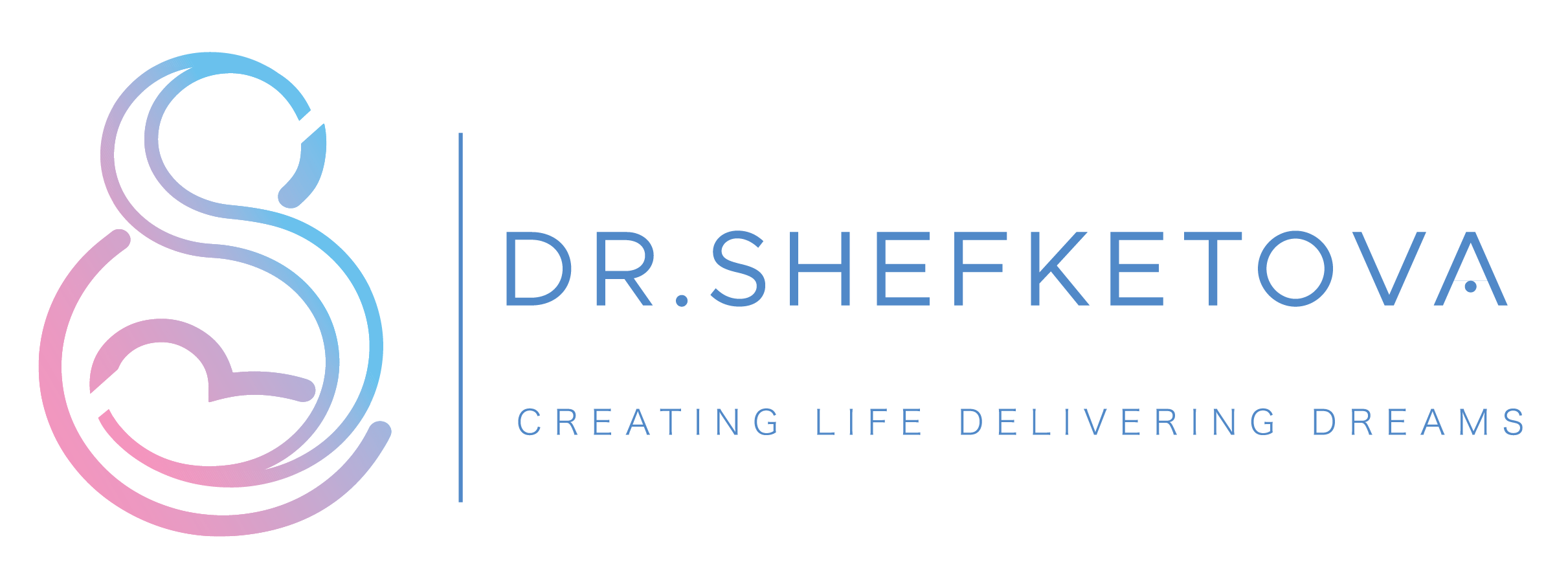Infertility Treatment
Healing Hands, Restoring Lives
Treatment Options for the Female Partner
Folliculometry
Folliculometry is an ultrasound-based method used to track follicle growth and precisely determine ovulation. By identifying the most fertile days, intercourse can be timed accordingly to maximize the chances of conception. Successful implementation of this approach requires ovulation, open fallopian tubes, and a semen analysis with normal parameters. This method is recommended for couples who do not have frequent intercourse or who have been trying to conceive for only a few months. In a natural cycle, follicle development is monitored without medical intervention, although ovulation-stimulating medication may be prescribed if needed. The optimal time for intercourse is then determined.
Controlled Intercourse
Another option is controlled intercourse following ovarian stimulation with oral medications or injectable gonadotropins. This approach is suitable for patients with absent or irregular ovulation, such as those with LUF syndrome or PCOS. Once the follicles reach the appropriate size, medication is administered to trigger ovulation, and the best timing for intercourse is identified.
Ovulation Induction
Ovulation induction involves the controlled stimulation of follicle growth using hormonal medications to regulate the cycle and promote the maturation of multiple eggs simultaneously. This technique is an essential component of controlled intercourse, intrauterine insemination (IUI), and in vitro fertilization (IVF).
In Vitro Fertilization (IVF)
IVF is a multi-stage assisted reproductive technique that can be performed using various methods, depending on individual patient needs.
Treatment Options
The key to resolving a case lies in an accurate diagnosis. When we know what we are dealing with, the process becomes much smoother. In no way is in vitro fertilization (IVF) the first method of choice, and the fact that you are patients at D-r Shefketova does not mean that IVF is the only solution to the problem.

services
In Vitro Fertilization (IVF) – A Path to Parenthood
IVF is a cutting-edge fertility treatment designed to help couples overcome reproductive challenges and achieve their dream of parenthood. This multi-stage process is tailored to each patient, utilizing advanced medical techniques to maximize success and provide a personalized approach to conception.
Hormonal Stimulation
The first and most critical stage of IVF involves controlled ovarian stimulation using subcutaneous hormone injections. The dosage is carefully individualized based on the patient’s ovarian response. This phase lasts approximately 10-12 days and is conducted under strict medical supervision. When the follicles are mature, a final injection is administered to trigger ovulation.
Fertilization in a Natural Cycle
Unlike conventional IVF, this method does not involve ovarian stimulation. Instead, the woman’s natural cycle is monitored, and the egg is retrieved just before ovulation occurs spontaneously.
Intrauterine Insemination (IUI)
IUI is a quick, minimally invasive fertility treatment that places concentrated motile sperm directly into the uterus, increasing the chances of fertilization. It is suitable for couples with open fallopian tubes and normal or mildly impaired sperm parameters. The procedure, performed in a natural or stimulated cycle, is painless, requires no anesthesia, and takes just minutes. After insemination, a short rest period helps optimize success. IUI is a cost-effective alternative to IVF but is not recommended for women with severe tubal issues, pelvic infections, or advanced endometriosis.
Follicle Aspiration and Egg Retrieval
Egg retrieval is performed under short intravenous anesthesia, in the presence of an anesthesiologist. Using ultrasound guidance, the eggs are aspirated from the follicles and immediately transferred to the embryology laboratory, where they are identified, isolated, and prepared for fertilization. After the procedure, the patient remains under observation for 2-3 hours before resuming normal activities. Some mild side effects, such as light vaginal bleeding and mild abdominal discomfort, may occur.
our services
Fertilization Methods – Science, Precision, and the Journey to Parenthood
Advancements in reproductive medicine offer diverse fertilization methods tailored to individual needs. Еach technique is designed to maximize success and bring hopeful parents closer to their dream. Understanding these options helps in choosing the right path to parenthood.
Embryo Culture
Once fertilization is confirmed, the developing embryos are cultured in a specialized nutrient medium for 3 to 6 days. It’s important to note that the embryos are not routinely monitored every day. Instead, they are closely observed only on the day following fertilization to check for proper development, and again on the day of embryo transfer (either Day 3 or Day 5). The reason for this is that embryos are best left undisturbed in the controlled culture conditions, as frequent handling or disruption can negatively impact their growth and development. During this critical period, the embryos are allowed to develop in a stable, consistent environment, ensuring optimal conditions for their growth.
Embryo Transfer
This is the final and most anticipated stage of the IVF process. Embryo transfer is ideally performed on day 3, 4, or 5 after fertilization. One or two high-quality embryos with the best implantation potential are selected and transferred into the uterus using a thin catheter under ultrasound guidance. The procedure is painless and similar to a Pap smear.
If additional high-quality embryos are available, they can be frozen and stored for future use, either in case of an unsuccessful cycle or to achieve another pregnancy later.
Assisted Hatching
Assisted hatching is a lab technique that uses laser technology to thin or puncture the embryo’s outer shell, improving implantation.
It’s recommended for:
- Thickened zona pellucida
- Repeated implantation failures
- Advanced maternal age
- Frozen embryo transfer
This helps the embryo implant more easily, enhancing success chances.
Embryo Freezing
Embryos of high quality that are not immediately used for transfer can be frozen using the vitrification method. Cryopreservation offers the advantage of future transfers, should pregnancy not occur in the current cycle.
In some cases, all embryos may be frozen if embryo transfer is not recommended due to factors like ovarian hyperstimulation syndrome (OHSS) or an unfavorable uterine lining—such as the presence of a polyp, bleeding, or other issues.
Frozen embryos can be stored safely and indefinitely, providing the opportunity for transfer at a later, more suitable time.
IVF with donor’s eggs
A donor egg may be the best way to achieve the goal of having a healthy child. If you are considering egg donation as the next step in your treatment, dr. Shefketova can help.
Am I a Suitable Candidate for Egg Donation?
Egg donation may be a suitable option for patients facing various medical conditions, including the absence of ovaries, premature ovarian failure, or infertility resulting from chemotherapy or radiation treatment. Donor eggs (oocytes) are also used for women who have had unsuccessful IVF attempts, recurrent pregnancy loss, or genetic disorders with a high risk of transmission to offspring. Before making a decision, Dr. Shefketova will assess your age, medical history, responses to previous fertility treatments, and the results of all necessary tests to determine the most appropriate approach for you.
How Is an Egg Donor Selected?
Choosing a donor is a personal process that can be tailored to your preferences. Some patients opt for an anonymous donor or select frozen eggs from an egg bank, while others prefer a biological connection to their child and choose a donor who is a relative. Whether a relative, a friend, or an anonymous donor, our dedicated team will guide you through every step of the process. Anonymous egg donation is usually carried out by specialized tissue banks that select suitable donors who are in excellent health and meet strict criteria. The appropriate donor is chosen based on the individual characteristics of the patient couple.
Who Is Considered the Mother?
In Bulgaria, the woman who carries and gives birth to the child is legally recognized as the mother. Once the embryo is transferred, your body plays a crucial role in its growth and development. Regardless of whether the recipients know the donor's identity or not, all donors are fully informed that they will not have any legal rights or obligations with respect to the children born as a result of the donation.
Donor Programs
IVF with donor’s sperms
A donor sperm may be the best way to help you achieve your dream of having a healthy child. If you are considering sperm donation as the next step in your treatment, Dr. Shefketova is here to help, offering expert guidance and personalized care throughout your fertility journey.
IVF with donor’s embryos
Using a donor embryo may be the key to making your dream of having a child come true. If you are considering this option as the next step in your treatment, Dr. Shefketova is here to provide professional support and a personalized approach to guide you through the entire journey to parenthood.
